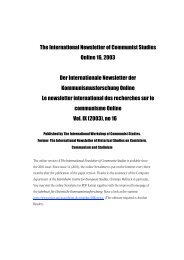VOL. XVI (2010), NO 23 - The International Newsletter of Communist ...
VOL. XVI (2010), NO 23 - The International Newsletter of Communist ...
VOL. XVI (2010), NO 23 - The International Newsletter of Communist ...
Sie wollen auch ein ePaper? Erhöhen Sie die Reichweite Ihrer Titel.
YUMPU macht aus Druck-PDFs automatisch weboptimierte ePaper, die Google liebt.
<strong>The</strong> <strong>International</strong> <strong>Newsletter</strong> <strong>of</strong> <strong>Communist</strong> Studies Online <strong>XVI</strong> (<strong>2010</strong>), no. <strong>23</strong> 43<br />
Jeannette Prochnow, Bielefeld Graduate School in History and Sociology, Bielefeld<br />
University (Germany):<br />
“…and then we said, man, it can’t be true that it’s all over!” An Ethnography <strong>of</strong><br />
Communication <strong>of</strong> an East German Commemorative Community. PhD<br />
Project. 1<br />
In June 1974, delegates <strong>of</strong> former COMECON member states2 signed the general<br />
agreement on economic collaboration to tap natural gas resources near Orenburg in the<br />
Soviet Union. This case study is concerned with current communicative practices <strong>of</strong> former<br />
GDR contract workers and delegates <strong>of</strong> the FDJ3 who were involved in the construction <strong>of</strong> a<br />
transnational pipeline in the former Soviet Union in the 1970s and 1980s. For many years<br />
two Trassenvereine (pipeline commemorative associations), founded by former pipeline<br />
workers, have developed cultural practices leading to a shared group identity. Negotiating<br />
the past at diverse communicative events, former pipeline employees constitute a vivid<br />
narrative community. Inside the communicative infrastructure <strong>of</strong> the group, a variety <strong>of</strong> topics<br />
are addressed such as career paths after the breakdown <strong>of</strong> socialism, the Orange Revolution<br />
in the Ukraine, transformations in East Germany after the Wende in 1989, and their work and<br />
life in the Soviet Union to name only a random selection.<br />
Building upon the ethnography <strong>of</strong> communication the project raises the question <strong>of</strong> which<br />
technical, biographical, socio-cultural and political features and circumstances have had an<br />
impact on the formation, maintenance and segmentation <strong>of</strong> the community <strong>of</strong> former GDR<br />
pipeline workers since the mid 1990s. <strong>The</strong> study focusses on social and cultural practices to<br />
cope with the process <strong>of</strong> social change and to establish meaningful linkages between the<br />
socialist past and the transforming respectively transformed East-German society. <strong>The</strong> case<br />
study is located within the social sciences, yet the findings have to be contextualised<br />
historically.<br />
<strong>The</strong> ideological entanglement <strong>of</strong> an economic venture: pipeline builders as GDR’s<br />
labour heroes.<br />
<strong>The</strong> first pipeline section was built between 1974 and 1978 in the Ukraine. This section was<br />
named “Drushba-Trasse”, a combination <strong>of</strong> the Russian word for friendship and an explicitly<br />
East German term for pipeline. A second pipeline section starting in the Ural Mountains near<br />
the city <strong>of</strong> Perm was built between 1982 and 1993. Altogether, approximately 15,000 mostly<br />
young, male workers were mobilized4 and worked in the Soviet Union for up to 10 years.<br />
People applied voluntarily for a contract within the framework <strong>of</strong> pipeline construction that<br />
also included affiliated obligations such as the development <strong>of</strong> the general infrastructure and<br />
dwelling places along the pipeline for the future Soviet operators.<br />
1 Supervisor: Pr<strong>of</strong>. Dr. Jörg Bergmann (Bielefeld University).<br />
2 <strong>The</strong> Czechoslovak Socialist Republic, the People's Republic <strong>of</strong> Bulgaria, the German Democratic Republic, the<br />
People's Republic <strong>of</strong> Poland, the People's Republic <strong>of</strong> Hungary and the Soviet Union.<br />
3 Freie Deutsche Jugend (Free German Youth), <strong>of</strong>ficial youth organisation in the GDR.<br />
4 Katharina Belwe: Zentrales Jugendobjekt der FDJ “Erdgastrasse”, Bonn, Gesamtdeutsches Institut, Bundesanstalt<br />
für Gesamtdeutsche Aufgaben, 1983. (Analysen und Berichte. 20/1983).














